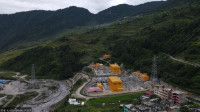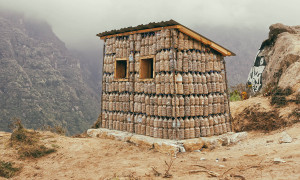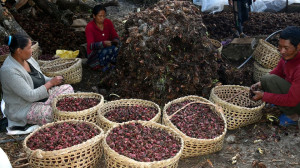Money
India’s ban on imports of refined palm oil could kill Nepal’s biggest export
The restriction is believed to be aimed at Malaysia but Nepal has been exporting palm oil worth billions of rupees to India by exploiting a zero-tariff facility.
Sangam Prasain
India on Wednesday imposed restrictions on imports of refined palm oil, in a move seen as a retaliation against Malaysia, but its repercussions are likely to be immediate in Nepal, as Nepal’s largest export is refined palm oil.
While government officials are worried about the restriction’s impact on Nepal’s export volume, experts say this situation was a long time coming, as traders had been exploiting a zero tariff facility on essential products.
India is the world’s biggest market for edible oil and Malaysia its top supplier. But on Wednesday, the Indian government said that it had amended its imports policy to designate refined palm oil imports “restricted” from “free”, effectively meaning a complete ban.
According to media reports, the Indian government’s restriction follows Malaysian Prime Minister Mahathir Mohamad’s criticism of New Delhi’s actions on Jammu and Kashmir and the new citizenship law.
For Nepal, the restrictions could potentially wipe out exports worth Rs22 billion or more annually, based on current export figures. Last year, Nepal exported processed palm oil, which is not produced in the country, worth Rs10.33 billion to India.
According to experts, the restrictions will cut traders’ profits and the government’s revenue. For sustainable trade, Nepal, however, needs to promote domestic products and services over products like palm oil, they said.
“This was bound to happen because the palm oil trade was exploiting the preferential treatment given to Nepal,” said Posh Raj Pandey, a trade expert and economist. “Traders earning money through tariff differences amounts to exploitation of a trade policy that offers zero tariffs on essential products.”
According to the Trade and Export Promotion Centre, Nepal imported crude palm oil worth Rs9.94 billion and exported processed palm oil worth Rs11.5 billion in the first five months of this fiscal year. Exports of palm oil have increased nearly eight times the amount shipped in the same period last year.
Palm oil is only the latest casualty of Indian restrictions. Lentils, chickpeas, betel nuts and many other products have faced a similar fate in the past, as India remains Nepal’s largest market and any restrictions can collapse entire industries.
The betel-nut industry in Jhapa collapsed after India banned imports in 2013. Nepali traders used to export betel nuts to India in volumes larger than what could have been possibly produced in Nepal.
This meant that imports from third countries were being re-exported to the southern neighbour to take advantage of its low customs duty, just like with palm oil. Importing one tonne of betel nuts and re-exporting it to India would provide traders with a net profit of Rs1.05 million due to custom tariff differences.
According to Pandey, Nepal has yet to learn how to promote domestic products.
“For sustainable trade, the country must focus on domestic products,” Pandey told the Post. “Palm oil was a gamble, and traders lost.”
In a recent interview with the Post, Jagdish Chandra Pokhrel, also an economist, said that a sharp rise in palm oil exports, without any ‘value addition’, could largely impact Nepali farmers, as it could offset the demand for other Nepali products.
“Traders will keep exploiting easy loopholes on foreign products that yield higher profits for them,” said Pokhrel.
The Ministry of Industry, Commerce and Supplies held an urgent meeting in Kathmandu to discuss Wednesday’s development in India.
Baikuntha Aryal, secretary at the ministry, said that they have collected suggestions from traders, the ministries of finance and agriculture, the Department of Commerce and Supplies, and the government would soon take a decision on how to deal with the issue.
“As there are diverse views on palm oil exports, we need to build a common understanding first before we go for bilateral talks with India,” Aryal told the Post.
According to Aryal, based on the ministry’s findings, although Nepal doesn’t produce palm oil, it has become a top export product with more than 30 percent of value addition.
To be eligible for tariff exemptions on Nepali exports to India, under the South Asian Free Trade Area agreement, imported goods need to have at least a 30 percent value addition.
But Pandey, who is also chairperson of the South Asia Watch on Trade Economics and Environment (SAWTEE), a consortium of South Asian NGOs working on trade and the economy, refuted the government’s claim.
“Except for transportation and processing, palm oil doesn’t have much value addition. We estimate the value addition to be around 15 percent,” said Pandey. “If the palm oil industry, which has grown to Rs11 billion in five months, had true value addition, it should have generated at least 11,000 jobs.”
According to Indian media reports, the ban on refined palm oil imports will help Indian refiners and local farmers, and help in creating new jobs.
According to Pandey, palm oil does not satisfy the requirement of 30 percent value addition to become eligible for the zero-tariff facility.
Some traders admitted that there was no monitoring from the government as it was happy to add to state revenue. Traders said they buy crude palm oil at Rs70 per litre and sell it at Rs102 per litre.
“After a minimum level of processing, they enjoy the tariff differences,” said Pandey.
The impact of the palm oil restriction is likely to impact around half a dozen processing plants along the Sunsari-Morang Industrial Corridor in eastern Nepal.
“Many processing plants have a large amount of crude palm oil worth millions of rupees in stock,” said Nanda Kishore Rathi, proprietor of the Pashupati Flour and Oil Mills. “We invested in the processing industry with the aim to export. If our products are restricted, it will largely impact us.”
A recent World Bank report attributes Nepal’s windfall in exports solely to increased demands for non-crude palm and soybean oil in India.
Tariff exemptions on Nepali exports to India under the South Asian Free Trade Area agreement gave domestic traders an incredible advantage. Countries outside of South Asia are slapped with tariffs of 54 percent on palm oil and 45 percent on soybean oil.
According to the Nepal Development Update, released by the World Bank in December, Nepal capitalised on this arbitrage opportunity and significantly increased exports of the two products.
“However, it might not be a sustainable option in the long run,” the report said.




 13.12°C Kathmandu
13.12°C Kathmandu













%20(1).jpg&w=300&height=200)
